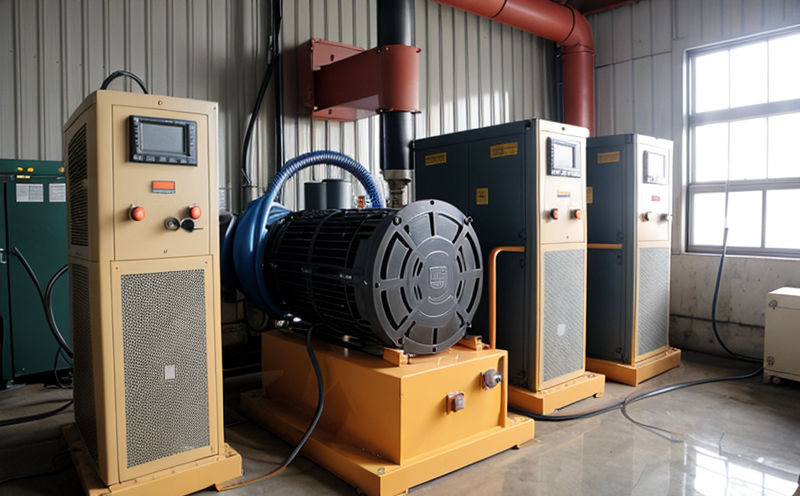EN 50160 Voltage Quality Testing in Power Generation
The EN 50160 standard is a pivotal document that sets the benchmark for ensuring voltage quality in electricity supply systems. This standard is particularly critical for power generation equipment, as it outlines the requirements to ensure that electrical energy delivered to consumers meets specified quality levels. The standard covers several key aspects including frequency deviation, voltage variation, voltage unbalance, and harmonic content.
The testing process under EN 50160 involves a series of rigorous checks aimed at verifying compliance with these parameters. It is essential for power generation facilities to ensure that the electricity they produce adheres strictly to the standards set by this regulation. This not only enhances consumer satisfaction but also helps in maintaining grid stability and reliability.
For quality managers and R&D engineers, understanding EN 50160 is crucial as it directly impacts product design and performance. Compliance with these standards can lead to significant operational efficiencies and cost savings. It ensures that the equipment you develop or procure meets industry benchmarks and performs reliably under various conditions. Additionally, meeting this standard enhances your company's reputation and market competitiveness.
The testing procedure typically involves measuring voltage levels at different points in the distribution network. Instruments like multifunction power meters are used to capture data on frequency deviation, voltage variation, unbalance, and harmonic content. These measurements are then compared against the limits specified by EN 50160 to determine compliance.
Understanding the real-world implications of non-compliance with these standards is also important. Non-conformance can result in power outages, increased maintenance costs, and even legal repercussions if it impacts public safety or environmental regulations. By adhering strictly to EN 50160, you can mitigate such risks and ensure smooth operations.
In summary, EN 50160 is a cornerstone for ensuring voltage quality in power generation equipment. It provides a framework that guarantees consistent and reliable electricity supply, which is essential for both the utility sector and consumers alike. The detailed testing procedures outlined in this standard are vital for maintaining high standards of electrical energy quality.
Quality and Reliability Assurance
The importance of quality assurance (QA) cannot be overstated in the context of power generation equipment testing. Ensuring that your equipment meets the stringent requirements set forth by EN 50160 is not just about compliance; it's about delivering reliable performance every time.
- Compliance: Adherence to international standards such as EN 50160 ensures that your products meet industry benchmarks. This enhances trust and confidence among stakeholders, including regulators and consumers.
- Operational Efficiency: By ensuring that your equipment performs within the specified parameters, you can reduce downtime and maintenance costs. Efficient operation also leads to better energy utilization rates.
- Credibility: Meeting these standards adds significant credibility to your brand. It signals to customers that you are committed to delivering high-quality products.
In addition to the above, it's important to note that quality assurance is an ongoing process. Regular audits and reviews help in identifying potential issues early on, allowing for timely corrective actions. This proactive approach ensures continuous improvement and long-term reliability of your equipment.
For R&D engineers and compliance officers, understanding QA processes within this framework is crucial. It enables them to design and implement solutions that not only meet current standards but also anticipate future changes in regulatory requirements. Continuous learning and adaptation are key components of maintaining a high level of quality assurance.
International Acceptance and Recognition
- Standardization: EN 50160 is widely recognized across Europe and beyond. Its adoption ensures that equipment standards are consistent, facilitating international trade and cooperation.
- Cross-Border Trade: Meeting these standards allows for seamless cross-border transactions without the need for additional certifications or modifications. This is particularly beneficial in a globalized market where companies often operate internationally.
- Regulatory Compliance: Many countries have adopted EN 50160 as part of their national regulations. Ensuring compliance with this standard helps avoid potential legal issues and ensures smooth regulatory processes.
The widespread acceptance of EN 50160 underscores its importance in the global power generation industry. By adhering to these standards, you demonstrate a commitment to international best practices, which is increasingly becoming a key factor for business success in today's interconnected world.
Environmental and Sustainability Contributions
- Emissions Reduction: Ensuring voltage quality through EN 50160 helps reduce the need for additional compensation measures, thereby minimizing emissions from backup generators.
- Resource Efficiency: By maintaining high voltage quality, you can optimize energy consumption, leading to reduced resource usage and waste generation.
- Sustainable Practices: Compliance with this standard aligns your operations with broader sustainability goals. It demonstrates a proactive approach towards environmental stewardship.
The focus on environmental sustainability is becoming more critical in the power sector. By adhering to EN 50160, you contribute positively to these efforts, promoting cleaner and more efficient energy production processes.
Moreover, the standard supports the transition towards renewable energy sources by ensuring that the grid can efficiently accommodate variable generation from solar and wind. This is crucial for the sustainable development of modern power systems.





